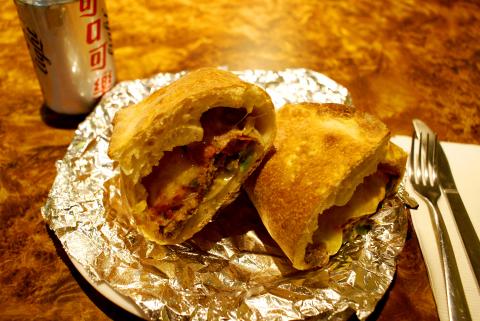“Best Stromboli you ever have!” reads the catchy caption at the top of Amore Pizzeria’s menu. That wouldn’t have been hard — I’d never had a Stromboli before entering Amore, which opened last month across the street from National Taiwan University on Xinhai Road. But after one bite of the fragrant, moist and meaty concoction that was presented to me 10 minutes after ordering, I was glad I had ordered it.
And there’s more to Amore. “Best pizza in town!” boasts a sign out front — fightin’ words. But they aren’t merely hyperbole. The homemade dough was rolled and baked into a crust that was just the right thickness, slightly crispy around the crimping and underneath, and chewy everywhere else. Mozzarella and a homemade sauce, infused with Italian herbs, covered the pie.
Amore Pizzeria’s space is plain — so plain that one could easily confuse it, as I initially did, for just another cheap knock-off pizza joint playing off guileless university students wanting a quick bite. Brown is the color of choice here: brown booths, brown tables, brown chairs and brown stools running along a brown bar. A few framed pictures — Michelangelo’s David, a caprese salad — break up the monotony.

Photo: Noah Buchan, Taipei Times
Though the decor is drab, Amore’s amiable owner, James Chen (陳建堂), knows what he’s doing. Having learned to cook Italian food in the early 1980s in New Jersey from an old Italian who ran six restaurants, Chen spent the past three decades perfecting what he does best: pizza.
He shuttered his three New Jersey shops in 2008 following the financial downturn, returned to Taipei after a 30-year hiatus and found the pizza here was not to his liking. “What is this ketchup and sugar?” he says.
Chen uses extra-virgin olive oil in his dough (which he blesses, Catholic style, before quartering it off and rolling it up) and in his Caesar salad dressing (which had a rich anchovy and caper finish). He makes the sausage and meatballs himself from scratch — again, learned from the New Jersey Italian — as he does the pasta sauces.
Stromboli is a turnover pizza similar to a calzone, but its dough is thicker. Chen said calzones are often made with ricotta, whereas Stromboli are made with mozzarella. The base is a vegetarian combination of onion, green pepper, tomato sauce and cheese, to which I added pepperoni and sausage (NT$320).
First, a warning: The Stromboli comes to the table piping hot and doesn’t cool off for quite a while, which can be dangerous. Generous slices of slightly spicy pepperoni and peppery sausage were evenly placed throughout the inside, so that a meaty morsel was found in every bite of bread.
Amore’s 12-inch supreme pizza (NT$480) earns its moniker. I haven’t seen so many toppings — sausage, meatball, pepperoni, green pepper and onion — for a long time. It may be possible that there are too many toppings. A rare case of too much of a good thing.

In the March 9 edition of the Taipei Times a piece by Ninon Godefroy ran with the headine “The quiet, gentle rhythm of Taiwan.” It started with the line “Taiwan is a small, humble place. There is no Eiffel Tower, no pyramids — no singular attraction that draws the world’s attention.” I laughed out loud at that. This was out of no disrespect for the author or the piece, which made some interesting analogies and good points about how both Din Tai Fung’s and Taiwan Semiconductor Manufacturing Co’s (TSMC, 台積電) meticulous attention to detail and quality are not quite up to

April 21 to April 27 Hsieh Er’s (謝娥) political fortunes were rising fast after she got out of jail and joined the Chinese Nationalist Party (KMT) in December 1945. Not only did she hold key positions in various committees, she was elected the only woman on the Taipei City Council and headed to Nanjing in 1946 as the sole Taiwanese female representative to the National Constituent Assembly. With the support of first lady Soong May-ling (宋美齡), she started the Taipei Women’s Association and Taiwan Provincial Women’s Association, where she

Chinese Nationalist Party (KMT) Chairman Eric Chu (朱立倫) hatched a bold plan to charge forward and seize the initiative when he held a protest in front of the Taipei City Prosecutors’ Office. Though risky, because illegal, its success would help tackle at least six problems facing both himself and the KMT. What he did not see coming was Taipei Mayor Chiang Wan-an (將萬安) tripping him up out of the gate. In spite of Chu being the most consequential and successful KMT chairman since the early 2010s — arguably saving the party from financial ruin and restoring its electoral viability —

It is one of the more remarkable facts of Taiwan history that it was never occupied or claimed by any of the numerous kingdoms of southern China — Han or otherwise — that lay just across the water from it. None of their brilliant ministers ever discovered that Taiwan was a “core interest” of the state whose annexation was “inevitable.” As Paul Kua notes in an excellent monograph laying out how the Portuguese gave Taiwan the name “Formosa,” the first Europeans to express an interest in occupying Taiwan were the Spanish. Tonio Andrade in his seminal work, How Taiwan Became Chinese,